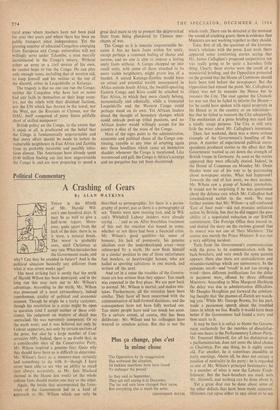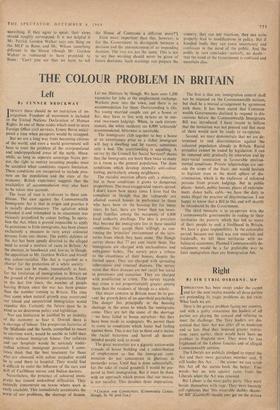Political Commentary
A Crashing of Gears
By ALAN WATKINS
The most striking fact is surely that the myth of Harold Wilson has been destroyed; and in the long run this may turn out to Mr. Wilson's advantage. According to the myth, Mr. Wilson was possessed of a most extraordinary, indeed superhuman, quality of political and economic acumen. Though he might be a tricky customer, though his resolution in a crisis might be open to question (and I accept neither of these criti- cisms), his judgment on matters of detail was unrivalled. He was supremely competent. Or so the myth went; and it was believed not only by Labour supporters, not only by certain sections of the press, but also by a large number of Con- servative MPs. Indeed, there is no doubt that, in a considerable slice of the Conservative Party, Mr. Wilson inspired a genuine fear. Quite why this should have been so is difficult to determine. Mr. Wilson's feats as a memory-man certainly had something to do with it—though I have never been able to see why an ability to recall (not always accurately, as Mr. Iain Macleod showed in the House last week) on the whole tedious facts should matter,one way or the other.
Again, the bustle that accompanied the form- ation of the Government led to a kind of approach to Mr. Wilson which can only be described as pornographic; for there is a porno- graphy of power, just as there is a pornography of sex. 'Events were now moving fast, and in Wil- son's Whitehall Labour insiders were already saying . . .' and so on. After breathless treatment of this sort the reaction Was bound to come, whether or not there had been a financial crisis. Mr. Wilson's good qualities—his sense of humour, his lack of pomposity, his genuine idealism over the underdeveloped areas—were submerged by a myth. He now finds himself in a similar position to one of those unfortunate fast bowlers, or heavyweight boxers, who are hailed as sporting salvations in one month, and written off the next.
And yet in a sense the troubles of the Govern- ment are less serious than they appear. Too much was expected in the first place. We are now back to normal. Mr. Wilson is mortal, and makes mis- takes. Furthermore, all the mistakes have been similar. They have- all been concerned with the communication of half-formed decisions; and the consequences have not been fully worked out. Too many people have said too much too soon. To a certain extent, of course, this has been deliberate : Mr. Wilson and his colleagues have wanted to simulate action. But this is not the whole truth. There can be detected at the moment the sound of crashing gears; there is evidence that Ministers are not working together as they should.
Take, first of all, the question of the Govern- ment's relations with the press. Last week there appeared some comforting stories saying that Mr. James Callaghan's proposed corporation tax was really going to be quite a harmless little thing. Clearly these stories were the result of a ministerial briefing; and the Opposition protested on the ground that the House of Commons should have been told before the newspapers. But the Opposition had missed the point. Mr. Callaghan's object was not to reassure the House but to reassure the City. The case against the Chancel- lor was not that he failed to inform the House— for he could have spoken with equal propriety in the House or in the country or on television— but that he failed to reassure the City adequately. The mechanism of a press briefing was used for a totally unapt purpose. The City is still very little the wiser about Mr. Callaghan's intentions.
Then, last weekend, there was a more serious example of the Government's handling of the press. A number of experienced political corre- spondents produced stories to the effect that the Government wanted to cut down the strength of British troops in Germany. As soon as the stories appeared they were officially denied. Indeed, in the House of Commons on Monday Mr. Denis Healey went out of his way to be patronising about newspaper stories. What had happened? Towards the end of last week, we may assume, Mr. Wilson saw a group of Sunday journalists. It would not be surprising if he was questioned about the defence cuts which Mr. Callaghan had foreshadowed earlier in the week. We may further assume that Mr. Wilson—a self-confessed 'East of Suez man'---did not promise unilateral action by Britain, but that be did suggest the pos- sibility of a negotiated reduction in our BAOR commitment. The Foreign Office then moved in, and denied the story on the curious ground that its source was not one of 'their Ministers.' The source was merely the Prime Minister. It \\,t, not a very edifying incident.
Turn from the Government's communication with the press to its communication. with the back-benchers, and very much the same pattern appears. Here also there are contradictions and misunderstandings which are unnecessary. In the pensions revolt—and 'revolt' is not too strong a word—three different justifications for the delay in payment were. offered by three different Ministers. According to Miss Margaret Herbison the delay was due to administrative difficulties. Mr Douglas Houghton put forward the comfort- ing thought that 'the gnomes of Zurich are watch- ing you.' While Mr. George Brown, for his part, made a passionate speech about the troubled times in which we live. Really it would have been better if the Government had found a story and then stuck to it.
It may be that it is unfair to blame the Govern- ment exclusively for the rumbles of dissatisfac- tion one hears in the Parliamentary Labour Party. Mr. Emanuel Shinwell, for all his distinction as a parliamentarian, does not seem the ideal choice as Chairman. For one thing, he is eighty years old. For another, he is sometimes inaudible at party meetings. Above all, he does not occupy a position of neutrality in the party: he is regarded as one of Mr. Wilson's principal lieutenants : he is a member of what is now the Labour Estab- lishment. But the back-benehers are stuck with Mr. Shinwell, and nothing can be done about it.
Yet a great deal can be done about some of the other defects that have been made apparent. Ministers can agree either to stay silent or to say
something. If they agree to speak, their views should roughly correspond. It is not helpful if Mr. Patrick Gordon Walker says one thing on the MLF in Bonn, and Mr. Wilson something different in the House (though Mr. Gordon Walker is rumoured to have protested to Bonn: 'Can't you see that we have to tell the House of Commons a different story?).
Even more important than this, however, is for the Government to distinguish between a decision and the announcement of an impending decision. The two are not the same. This is not to say that warning should never be given of future decisions. Such warnings can prepare the country, they can test reactions, they can quite properly lead to modifications in policy. But if handled badly they can cause uncertainty and confusion in the mind of the public. And the public in turn concludes—unfairly, no doubt— that the mind of the Government is confused and uncertain also.



































 Previous page
Previous page